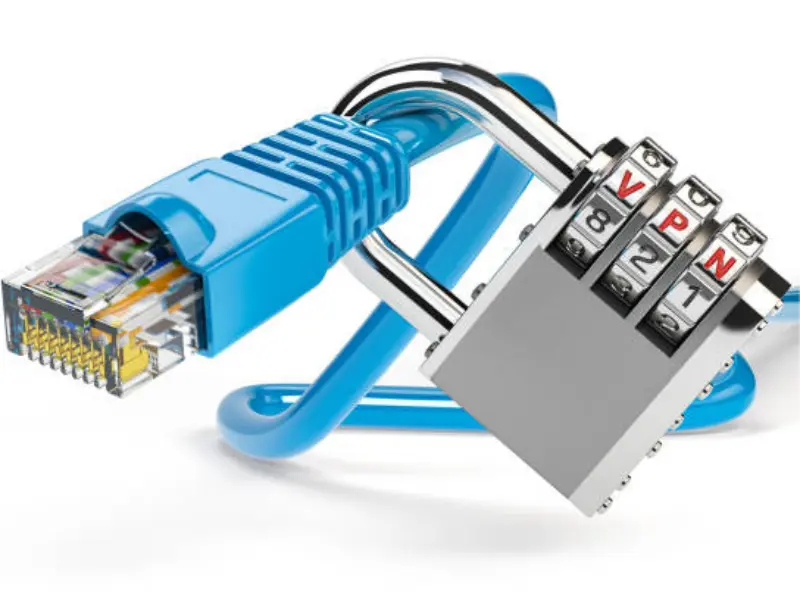- A VPN slows down your internet because it adds extra steps to the process of getting data from your home network to your internet provider.
- The level of encryption, the choice of VPN protocol and the use of data compression all play a significant role in how much bandwidth a VPN consumes.
- Users must weigh the benefits of increased security against the potential reduction in internet speed and increased data usage, especially in bandwidth-constrained environments.
Virtual Private Networks (VPNs) are a great way to keep your online activities private and secure. They use advanced encryption protocols to add extra information to each data packet, which usually means a 5-15% increase in data usage. By securing data transfers and anonymising user activity, VPNs offer a big boost to your cybersecurity protection.
While VPNs are effective at protecting privacy, it’s important to consider their impact on internet performance. Users with high-speed internet connections may experience minimal slowdowns, but those with limited bandwidth or data caps could see a significant drop in speed. This is particularly noticeable during data-intensive activities such as streaming video or downloading large files, where the extra data load from VPN encryption can strain the network.
Understanding VPNs and bandwidth
Encryption and data transfer: A VPN secures Internet connections by encrypting data that travels between a user’s device and the VPN server. This encryption process increases the amount of data transferred by adding additional information to each data packet. Typically, this results in a 5-15% increase in data usage, which has a direct impact on bandwidth consumption. The exact increase depends on the encryption protocol, the strength of the encryption and the size of the original data packets.
Also read: What is a VPN and how does it work?
Factors affecting VPN bandwidth usage
Strength of encryption: Stronger encryption adds more data to each packet and therefore uses more bandwidth. VPN services vary in their encryption techniques, which affects how much extra data is generated.
VPN protocols: Different protocols (such as OpenVPN, PPTP and L2TP/IPSec) handle data security differently. Some prioritise speed and efficiency, while others focus on maximising security, which can increase bandwidth usage.
Data compression: Some VPNs use data compression techniques to mitigate the bandwidth increase caused by encryption. This can help reduce the overall impact on data usage, but may compromise data integrity or security.
Also read: Does a VPN safeguard Your online privacy and security?
How VPNs affect connection speed
Although VPNs increase data usage, the effect on actual internet speed can vary depending on the user’s basic internet service. For those with high-speed connections, the additional data may not have a noticeable impact on internet speeds. However, for users with bandwidth limitations or data caps, VPNs can slow internet speeds and lead to a faster depletion of available data, especially during data-intensive activities such as streaming or large downloads.
How can you make a VPN faster?
Avoid free VPNs: They might work if you’re on a budget, but they don’t perform as well as subscription-based VPNs. They have fewer servers, so you share with more users. Some have bad software that uses your bandwidth. Some VPNs collect and sell your data, so avoid them. For the best speeds and security, use a well-vetted VPN with a monthly or annual subscription.
Switch your VPN server location: The best VPNs have servers all over the world. Some servers work better than others, depending on where they are and how many people are using them. Pick a server close to you to reduce data routing time
Use the WireGuard protocol: Although OpenVPN is the most common and respected VPN protocol in use today, a newer protocol called WireGuard has been attracting positive attention since its launch in early 2021. Speed tests show it to be faster and more efficient than OpenVPN – although the latter is still stronger for privacy. Most top VPNs allow you to switch between different protocols, and NordVPN specifically supports WireGuard. You can switch between protocols in your VPN by going to the settings menu. You can also adjust the protocol settings to increase your speed.
Get a better VPN: Of course, if you’re experiencing persistent speed problems with your VPN, you can always try a new one to see if it performs better. NordVPN, ExpressVPN and Surfshark are often the top-rated VPNs, but there are plenty of others worth trying. Check out our guide to the best VPNs for recommendations.
Weighing benefits against bandwidth costs
While VPNs offer enhanced security and privacy, the increase in bandwidth usage is an important consideration, especially for users with limited Internet plans. For people in high security environments, such as using public Wi-Fi or accessing sensitive information, the trade-off may be worth the extra bandwidth. However, for casual home browsing, users may prefer to disable VPNs to conserve bandwidth and maintain faster Internet speeds.
Users need to balance the security benefits of using a VPN with its impact on bandwidth and Internet speed. By understanding how VPNs work and the factors that affect their efficiency, users can make more informed decisions tailored to their specific Internet usage patterns and security needs.

